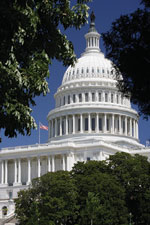Advertisement
Grab your lab coat. Let's get started
Welcome!
Welcome!
Create an account below to get 6 C&EN articles per month, receive newsletters and more - all free.
It seems this is your first time logging in online. Please enter the following information to continue.
As an ACS member you automatically get access to this site. All we need is few more details to create your reading experience.
Not you? Sign in with a different account.
Not you? Sign in with a different account.
ERROR 1
ERROR 1
ERROR 2
ERROR 2
ERROR 2
ERROR 2
ERROR 2
Password and Confirm password must match.
If you have an ACS member number, please enter it here so we can link this account to your membership. (optional)
ERROR 2
ACS values your privacy. By submitting your information, you are gaining access to C&EN and subscribing to our weekly newsletter. We use the information you provide to make your reading experience better, and we will never sell your data to third party members.
Policy
A Fast Start For Congress
Democrats quickly push controversial measures through the House
by Lois Ember, Bette Hileman, and Susan Morrissey
January 15, 2007
| A version of this story appeared in
Volume 85, Issue 3
Democrats in the House of Representatives got off to a strong start last week by passing some of the bills on their ambitious agenda for the first 100 hours of the 110th Congress. Several of the measures will impact the chemical enterprise, including national security changes, stem cell research funding, earmarks, and prescription drug prices.
The first bill to pass on the Democrats' legislative push, H.R. 1, would implement most of the recommendations of the 9/11 Commission that the previous Republican-led Congress had not enacted. More than a third of House Republicans joined their Democratic colleagues in passing the measure on Jan. 9.
Introduced by Rep. Bennie G. Thompson (D-Miss.), chairman of the House Homeland Security Committee, H.R. 1 requires that homeland security grants be based on risks and threats, mandates that all sea and air cargo be inspected, and spells out measures to stem the spread of weapons of mass destruction. It also boosts the powers of an existing civil liberties board that oversees U.S. antiterrorism efforts.
On the same day, the Senate's homeland security committee, chaired by Sen. Joseph I. Lieberman (I-Conn.), held a hearing on the status of the recommendations made by the 9/11 Commission, which was formed after the 2001 terror attacks. The Senate panel will vote on a bill at the end of the month that is expected to differ substantially from the House-passed bill.
The House also passed H.R. 3, legislation that would expand the number of embryonic stem cell lines that are eligible for federal research funding. The Senate is expected to vote on its own stem cell bill within a few weeks.
The legislation would allow researchers to use federal funds to study stem cell lines derived from embryos that were originally created for fertility treatment but are no longer needed and are scheduled to be discarded. Although federal funds could not be used for the actual derivation of these cell lines, the bills would greatly increase the number of cell lines approved for use in federally funded research.
The bills are identical to legislation vetoed by President George W. Bush in July 2006, and the White House has already said the President would veto this legislation, too.
The House also adopted a set of tougher ethics rules that include provisions to make earmarks and suspensions of import tariffs more transparent. The rules require public disclosure of an item's sponsor, purpose, and cost when either earmarks or tariff suspensions are added to legislation. The rules do not limit the number of earmarks, however.
Another item on the agenda is changing Medicare Part D on prescription drug benefits to allow the government to negotiate directly with companies on drug prices. The bill, H.R. 4, repeals the current provision prohibiting the secretary of Health & Human Services from bargaining for lower prices for some 40 million Medicare recipients. However, the bill prohibits the government from establishing a formulary, that is, a select list of drugs approved for reimbursement under Medicare Part D.
The drug-pricing bill is expected to pass quickly in the House, but it will face some opposition in the Senate, where Finance Committee Chairman Max S. Baucus (D-Mont.) plans to hold hearings on the issue.






Join the conversation
Contact the reporter
Submit a Letter to the Editor for publication
Engage with us on Twitter